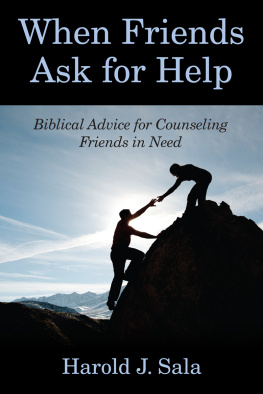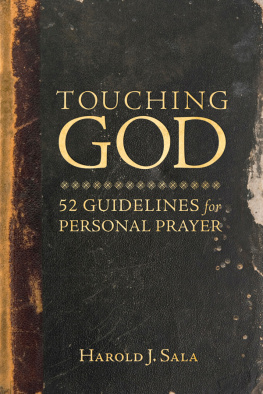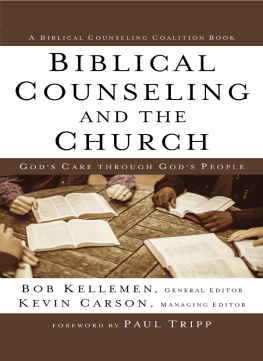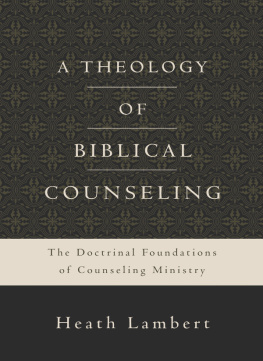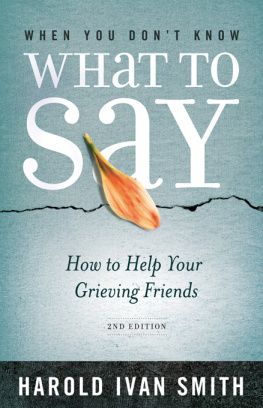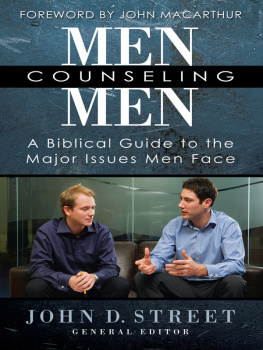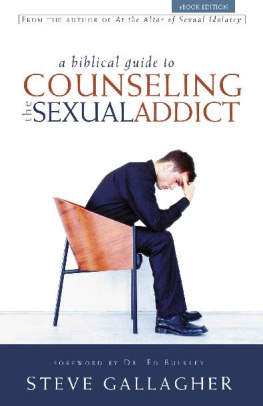
Copyright 2013 by Harold J. Sala
All rights reserved.
978-1-4336-7938-4
Published in eBook only by B&H Publishing Group
Nashville, Tennessee
All Scripture quotations, unless otherwise indicated, are taken from Holy Bible: New International Version , NIV. Copyright 1973, 1978, 1984 by the International Bible Society. Used by permission of Zondervan. All rights reserved.
Other Scripture quotations are taken from:
Holy Bible: King James Version, KJV.
New American Standard Bible , NASB. Copyright 1960, 1962, 1963, 1968, 1971, 1972, 1973, 1975, 1977 by The Lockman Foundation. Used by permission. All rights reserved.
Holy Bible: New King James Version , NKJV. Copyright 1982 by Thomas Nelson, Inc. Used by permission. All rights reserved.
The Living Bible , TLB. Copyright 1971. Used by permission of Tyndale House Publishers, Inc., Carol Stream, Illinois 60188. All rights reserved.
DEDICATION
To my wonderful wife, Darlene,
who has been my closest friend
and the best counselor I ever had
Contents
Preface
More advice is given by friends than by all the psychiatrists, psychologists, and counselors put together. And why not? Who is in a better position to give advice than a friend? After all, whose idiosyncrasies, temperaments, strengths, weaknesses, abilities, and even failures do you know better than your friends? Besides, were all more apt to take advice from a friend than we are to consider going for professional counseling.
Thats why I wrote this book. Its for all of you who have had little, if any, training in counseling or therapy, yet find yourselves helping other people work through personal problems. You are laypeople who work with others as Bible study leaders, Sunday school teachers, fellowship leaders, teachers, deacons, and church officers. People with problems seem to feel that they will be helped by taking things over with you.
This book is not technical but easy to understand, practical, and scriptural. After all, most of what Jesus said was communicated with nontechnical language, and He was readily understood.
You have probably never thought of yourself as someone who could make a significant contribution to the lives of other peopleyet when you stop and think of the conversations youve had with friends and acquaintances, youll recognize that youve dispenses a lot of advice and support. This book will help you do a better job helping people work through their problems.
The name of individuals I have described have been changed to protect their identities, but the situations about which I have written happened to real people who faced intense, personal problems.
My special thanks to the late Vernon Groundsa friend and mentor for many yearswho long ago challenged me to reach out and touch the lives of hurting men and women. Last of all, I am grateful to my wife, Darlene, and my daughter, Bonnie Craddick, both of whom gave me sound counsel from a womans perspective.
Harold J. Sala
Mission Viejo, California
I welcome your comments and questions. You can write to me at the following address:
Dr. Harold J. Sala
Guidelines International
Box G
Laguna Hills, CA 92654
E-mail: guidelines@guidelines.org
CHAPTER 1

You Can Help People!
What do you think I should do?
How often have you been asked this question as you have a cup of coffee with a friendor as you stood chatting with a friend in the parking lot after a meeting?
Well, what do you think I should do? Youre on, friend.
You may not be a trained counselor. You may have never even taken a night class in counseling or psychology. You may never have even thought of yourself as someone who could significantly help anyone else, yet as soon as you say, Ah, well, heres what I think... , you are giving counsel. God has opened a door for you to help someone. You are in a position to be used as a channel of divine guidance, to be used in a way that you had never considered possible.
We naturally seek the advice and counsel of those who know us and are closest to us. After all, we are comfortable with our peers and can easily relate to them. We are not embarrassed to talk with them about intimate and personal needs, especially when we are relatively sure they already comprehend what we are facing. With friends, we are not intimidated by the stigma that is often attached to making appointments and going to an office for help.
I am convinced that you do not have to be a psychologist or a clinically trained psychoanalyst to help people. You do not have to be able to interpret dreams or read inkblots or recognize profound psychological insights. Most of the counseling dispensed today is given out to people who have had little training, if any, when it comes to counseling.
In reaction to Freudian psychology or humanistic concepts, some Christians have taken a negative position against psychology and counseling in general. Instead, they should have opposed those forms of counseling that violate scriptural principles. Giving advice or counsel is not the problem; the problem is giving the wrong kind of counsel. Unfortunately, some Christians have tended to throw out the baby with the bath of water.
I have heard people say, I dont believe in counselingjust preaching and praying! But whenever someone says, I think you should... , suggesting a course of action to a friend, that person is acting as a counselor. What is more, the anticounseling mentality also fails to recognize that Christs healing ministry was the purest psychiatry ever applied to the emotional wounds of hurting men and women.
When I was in college, the founder of the Christian university I attended reflected a bias of his generation when he said, Boys [meaning ministerial students], you dont need courses in counseling. All you need is common sense! An oversimplification? Yes! Especially since common sense isnt so common anymore!
If we called counseling by some other namesay, discipling or ministeringperhaps it would be more acceptable to some. Paul wrote that we who believe in Jesus Christ have been given the ministry of reconciliation, which means we bring men and women back into harmony with our heavenly Father and with each other (see 2 Cor. 5:1819). Helping to heal broken relationships is one of the most significant contributions you can ever make.
You Have a Mandate to Help People
Writing to the Galatians, Paul instructed, Brothers, if someone is caught in a sin, you who are spiritual should restore him gently (Gal. 6:1 NIV). The word Paul used for sin, paraptoma , means false step, trangression. In the context of life today it means a wrong decision, a poor choice, a relationship that is bound to end in disharmony and suffering. Its a strong word. But the action required to help save a person from sins fate is both gentle and firm; only those who really care are willing to risk helping another. But if we hope to be truly spiritual, we cannot turn our backs on those who have sinned.
People ask that questionWhat do you think I should do?for a variety of reasons. At times they are simply seeking validation for what they really want to do and probably will do anyway, no matter what you say. But more often than not the question is asked when a person is uncertain and searching.
Who am I to tell someone else what to do? you might be wondering.
Long ago the Psalmist wrote, The godly man is a good counselor because he is just and fair and knows right from wrong (Ps. 37:3031 TLB). Who are you to tell someone else what to do? You are a child of God who is planted on the Rock, Christ Jesus! You dont have to be a Kay Arthur or Billy Graham. God can use your objective perspective to help your friend.
Next page
